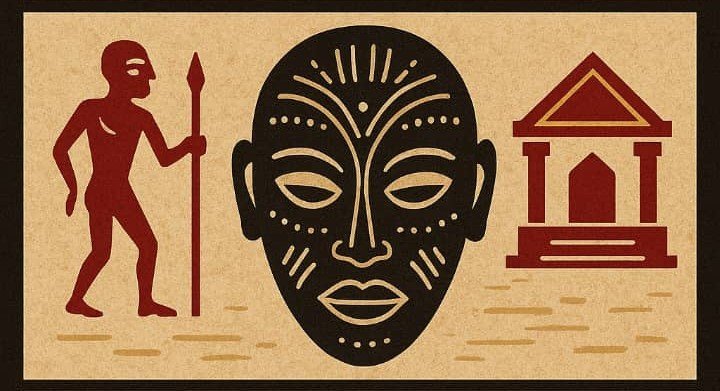Part One: Origins of Witchcraft — A Multidisciplinary Journey Through Spirit, History, and Power.
By Emmanuel Mihiingo Kaija
Evangelist And Missionary Grounded In Bible Studies, Theology, Church Ministry And Interdisciplinary Studies.
Emkaijawrites@gmail.com
Long before cartographers traced Africa’s contours or colonial powers inscribed their laws, the continent breathed as a living cosmos where spirit, ancestor, and human intertwined in sacred symphony. Indigenous African epistemologies teach us that reality is woven from visible and invisible threads alike—woven by the hands of ancestors, the whispers of forest spirits, and the rhythm of earth’s heartbeat. The Baoulé people tell of Nzulezo, the sacred amphibious shrine where communication with ancestors flows like water between worlds—a parable of balance and connection. In these worlds, witchcraft was not mere superstition but a vital acknowledgment of secret forces that could heal or harm, protect or destroy. As the Baoulé proverb warns, “An unseen enemy is the most dangerous,” naming the profound fear and respect for spiritual power hidden in shadow.
This belief found expression in stories passed down across generations, such as the Yoruba tale of Ọ̀rúnmìlà, the deity of wisdom and divination, who teaches that true knowledge requires patience, discernment, and community harmony. A Yoruba saying encapsulates this: “A single tree cannot make a forest.” Witchcraft accusations thus emerge not in isolation but within webs of social relations—often reflecting collective anxieties, power struggles, and quests for justice. Anthropologically, witchcraft functions as a social language, a communal attempt to explain suffering and restore balance when misfortune—illness, death, famine—strikes without clear cause.
As kingdoms like Egypt, Ghana, Mali, and Songhai rose between the first millennium CE and the late medieval period, spiritual and political authority merged. Kings ruled as divine agents; priests safeguarded cosmic order. Justice systems included witchcraft accusations as means to protect society, though often fraught with gendered and political bias. A Shona proverb captures this complexity: “The tongue does not weigh anything, but it can break bones.” Words accusing one of witchcraft could destroy lives—especially those of women, children, and elders vulnerable to social exclusion.
The spread of Islam from the 7th century introduced legal and theological paradigms that condemned sorcery as shirk (idolatry), blending and sometimes clashing with indigenous beliefs. Islamic jurisprudence influenced courts in West and North Africa, often intensifying persecution of alleged witches. Yet, syncretism flourished—African spiritualities absorbed and transformed these influences, creating a dynamic and contested spiritual landscape.
The arrival of European colonialism wrought the most devastating upheaval. The 1884–1885 Berlin Conference partitioned Africa arbitrarily, disregarding spiritual geographies and communal bonds. Colonial administrations imposed foreign legal frameworks that criminalized indigenous religions, branding witchcraft as devil worship. Missionaries like E. A. Walls lamented, “We have so often failed to understand that African spirituality is not simply superstition but a profound search for meaning” (The Gospel in the African Context, 1935). Yet many colonial powers weaponized witchcraft accusations to fracture communities, suppress dissent, and maintain control. The Congolese proverb “The hand that strikes the fire will be burned” serves as a searing metaphor for these cycles of violence and misunderstanding. Witch camps, such as those established in Ghana during the 1980s, emerged as tragic legacies—sanctuaries for accused women yet stark reminders of societal fracture and fear.
From a psychological lens, these accusations reflect collective trauma, social stress, and communal attempts to manage uncertainty. Social psychologist Frantz Fanon’s insights in The Wretched of the Earth (1961) illuminate how colonial violence imprints deep wounds, fostering suspicion and scapegoating as survival strategies in disrupted societies. Economic hardships, political instability, and rapid urban migration exacerbate fears, fueling cycles of accusation. The feminist scholar Ifi Amadiume’s work highlights how patriarchal structures disproportionately target women, linking witchcraft accusations to struggles over gender, power, and inheritance. In Nigeria between 1970 and 1990, Pentecostal ministries amplified these dynamics, branding thousands of children as witches, often leading to abandonment or abuse. UNICEF’s 2014 report estimates over 15,000 Nigerian children exiled due to witchcraft accusations—a human toll that echoes Isaiah’s lament, “The earth mourns and withers” (Isaiah 24:4).
Modern media and technology shape this crisis anew. Viral videos, social media rumors, and televangelist broadcasts spread fear rapidly, but also offer platforms for advocacy and truth-telling. NGOs and church ministries have begun pioneering restorative justice models and protective interventions, offering healing and hope. The Church, historically complicit at times, stands at a prophetic crossroads. Biblical wisdom calls for courage and compassion: Paul urges the “armor of God” (Ephesians 6:10–18), not for violence against neighbors but for spiritual discernment; Psalm 82 commands, “Defend the weak and the fatherless; uphold the cause of the poor and the oppressed” (Psalm 82:3). Jesus’s ministry among outcasts models the unmasking of lies with love and power.
African theologian Mercy Amba Oduyoye reminds us, “True faith must engage with culture, not destroy it.” The Akan proverb resonates deeply: “Wisdom does not come overnight.” Unraveling witchcraft’s origins demands patient listening, communal healing, and bold truth-telling. This is a journey from shadow into light—an unveiling of lies to reclaim dignity, restore justice, and awaken the soul.








